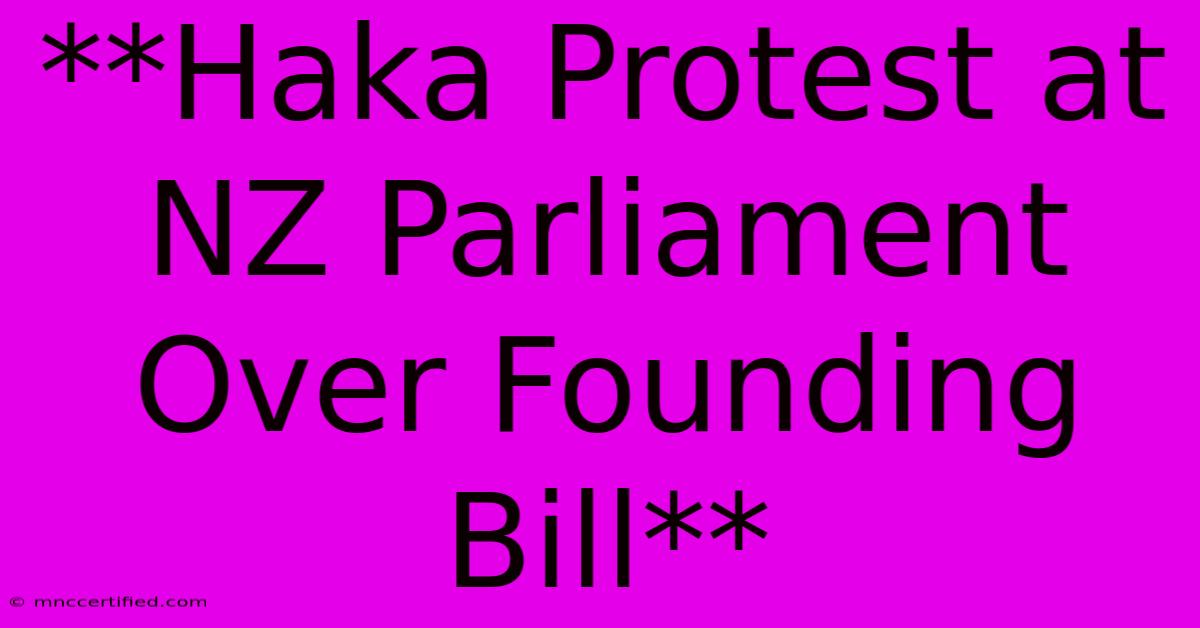**Haka Protest At NZ Parliament Over Founding Bill**

Table of Contents
Haka Protest at NZ Parliament Over Founding Bill: A Look at Māori Activism
On [date of protest], a powerful display of cultural protest unfolded outside the New Zealand Parliament building in Wellington. A group of Māori activists, led by [name of protest leader], performed a traditional Haka, a powerful war dance, to voice their deep opposition to the proposed "Founding Bill." This bill, considered controversial by many Māori, aims to enshrine certain aspects of New Zealand's history and identity in law.
Understanding the Haka and its Significance
The Haka is a cornerstone of Māori culture, often used in ceremonial contexts like welcoming guests or preparing for battle. It serves as a powerful symbol of strength, unity, and defiance. In the context of the recent protest, the Haka acted as a powerful statement of the Māori community's discontent with the proposed Founding Bill.
The Founding Bill and Māori Concerns
The Founding Bill has been met with mixed reactions, particularly within the Māori community. While some see it as a positive step towards acknowledging the nation's history and recognizing Māori rights, others feel it doesn't go far enough, or even perpetuates existing injustices.
The key concerns raised by protesters include:
- Lack of consultation with Māori: Protesters argue that the bill was drafted without sufficient consultation with Māori leaders and communities.
- Inadequate recognition of Māori sovereignty: Critics believe the bill fails to adequately acknowledge the Treaty of Waitangi and the ongoing fight for Māori self-determination.
- Concerns over potential impacts on Māori land rights: Some fear the bill could undermine existing Māori land ownership and resource management rights.
The Haka as a Symbol of Resistance
By performing the Haka at Parliament, the protesters aimed to send a clear message to the government. The dance, often associated with strength and determination, served as a powerful symbol of resistance against perceived injustice. It highlighted the Māori community's commitment to fighting for their rights and ensuring their voices are heard in the political arena.
The Future of the Founding Bill
The protest has drawn attention to the complex and sensitive nature of the Founding Bill. While the government has stated its commitment to engaging with Māori communities, the future of the bill remains uncertain. The protest serves as a reminder of the importance of listening to the voices of marginalized communities and ensuring their perspectives are considered in any legislation that impacts their lives.
This event underscores the continued relevance of the Haka as a powerful tool for social change and a symbol of Māori pride and resistance. As the debate surrounding the Founding Bill continues, it's essential to recognize the importance of open dialogue, respectful engagement, and a genuine commitment to addressing the concerns of the Māori community.

Thank you for visiting our website wich cover about **Haka Protest At NZ Parliament Over Founding Bill**. We hope the information provided has been useful to you. Feel free to contact us if you have any questions or need further assistance. See you next time and dont miss to bookmark.
Featured Posts
-
Infowars Sold Alex Jones Outraged By Buyer
Nov 15, 2024
-
Mc Guinness Honored Announces Exciting Career Move
Nov 15, 2024
-
Nations League Round Up Italy And France
Nov 15, 2024
-
Vulcan Gas Company Upcoming Events
Nov 15, 2024
-
1 1 Draw Venezuela And Brazil Split Points In Qualifiers
Nov 15, 2024